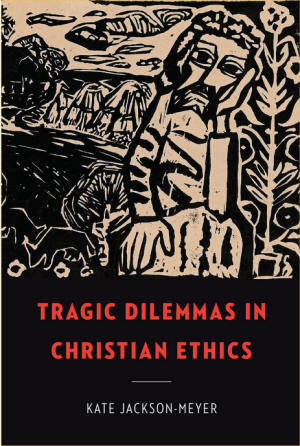Catholic Medical Quarterly Volume 72 (4) November 2022
Book Review
Tragic Dilemmas In Christian Ethics
by Kate Jackson-Meyer.
Georgetown University Press
Reviewed by Dr Pravin Thevsasathan
 Tragic
dilemmas are moral dilemmas that involve tragic outcomes. In this highly
readable work, the author examines many such cases when we might have to
choose between non-negotiable moral obligations rooted in the Christian
commitment to protect human life. If the aim of a work of ethics is to get
the reader to think deeply about such moral issues, then the author has
succeeded admirably. Which is not quite the same thing as saying that I am
in agreement with all of the author's conclusions.
Tragic
dilemmas are moral dilemmas that involve tragic outcomes. In this highly
readable work, the author examines many such cases when we might have to
choose between non-negotiable moral obligations rooted in the Christian
commitment to protect human life. If the aim of a work of ethics is to get
the reader to think deeply about such moral issues, then the author has
succeeded admirably. Which is not quite the same thing as saying that I am
in agreement with all of the author's conclusions.
The author cites the tragic case of Jews escaping the Nazis and finding themselves in a wood. Among the group, there is a mother with a six year old child and a crying baby. The group tells her that if she wishes to remain with the group and escape, the crying baby will have to be killed. Otherwise, the Nazis will find the group. The mother kills her baby in order to save the life of her six year old child. The act is tragic, even understandable. Personal culpability is surely mitigated due to the constrained situation she finds herself in. We can think of similar situations. Was it right to bring an end to the Second World War by the deliberate targeting of innocent civilians? I will argue that you cannot intentionally kill an innocent human being in order that some good might come from it. The intentional killing of innocent human life is always wrong. Circumstances can reduce the culpability of the moral agent.
The author notes that an intrinsically evil act is an action whose moral object is bad no matter the circumstances. She also gives the example put forward by Cathleen Kaveny of a person who sets fire to his house in order to receive money from insurance, while knowing that a person will die in the fire. Kaveny argues that burning a house down is not an intrinsically bad act. But, surely, intentionally doing something knowing that an innocent person is going to get killed is an intrinsically bad act. The author quotes Elizabeth Anscome as saying that "when one knows with certainty that an act will cause the death of an innocent person, then causing the death of an innocent person is part of the act."
The author examines the case of an innocent girl being likely killed in a strike against terrorists planning an attack. The principle of double effect regards the death of the terrorists as intended while the girl's death is regarded as unintended but foreseeable and proportionate. Of course, the death of the innocent girl is terrible. But I would argue that it is unintended. It would have been different had the police aimed their guns at the innocent girl.
In summary, this is a book that helps the reader reflect on tragic dilemmas. As such, it was definitely a helpful read.
